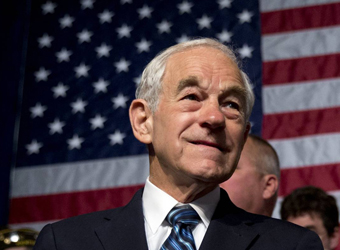Former Texas Congressman Ron Paul, who has run for president several times, is predicting that the Federal Reserve’s actions will have serious consequences for the stock market, just as the latest growth figures suggest the economy may have hit a soft patch.
According to government figures released on Friday, the nation’s gross domestic product fell to 0.7% in the first quarter — the lowest rate in three years— as personal spending slid to its worst level since 2009. That data came on the heels of a jobs report that showed the economy created far fewer jobs in March than the prior month, even as the unemployment rate fell.
Paul told CNBC a correction is “inevitable,” even as investors cheer the Nasdaq Composite’s new record highs.
“We spend too much, we borrow too much, and we distort the markets,” said Paul on “Trading Nation” this week. “The bigger the distortions have lasted, the bigger the bust will be.”
The Federal Reserve holds its meeting on interest rates the first week in May. Wall Street doesn’t predict a rate hike this time, but the consensus still calls for two more rate hikes this year.
In the coming months, the Fed also plans to unwind its balance sheet, which holds $4.5 trillion in bonds.
But Paul, a Republican known for his libertarian policies, predicted it will be too little, too late. He warned the Fed is going to push the economy over the edge, and should have let the market determine the rate of interest.
“It has been especially bad in the last ten to 15 years. I mean they have driven these interest rates so terribly low, and everybody was recognizing it even when Greenspan was there,” said Paul, who believes it’s very likely the Fed will unwind during a market downturn.
“There’s enough evidence around it even though there’s some euphoria on Wall Street. I still think there are serious problems in the economy,” he added.
The main problems Paul sees are “uncontrollable spending” and financial issues affecting the middle class.
“When monetary policy destroys the currency, it always destroys the middle class,” he said.
Not even the Nasdaq’s historic milestone is altering Paul’s read on the markets. The index broke 6,000 this week for the first time ever.
“All you have to do is go back to the year 2000, and the Nasdaq was at 5,000. And now it’s all the way up to 6,000, after what, 17 years?,” asked Paul, who’s been invested in gold.
“Gold back then was less than $300, and it’s $1,200. So I would say gold has done very, very well in that period of time,” Paul said. “And besides the 20 percent increase in the Nasdaq, if you discount for the inflation … that’s not the greatest investment in the world. “
Source: CNBC


